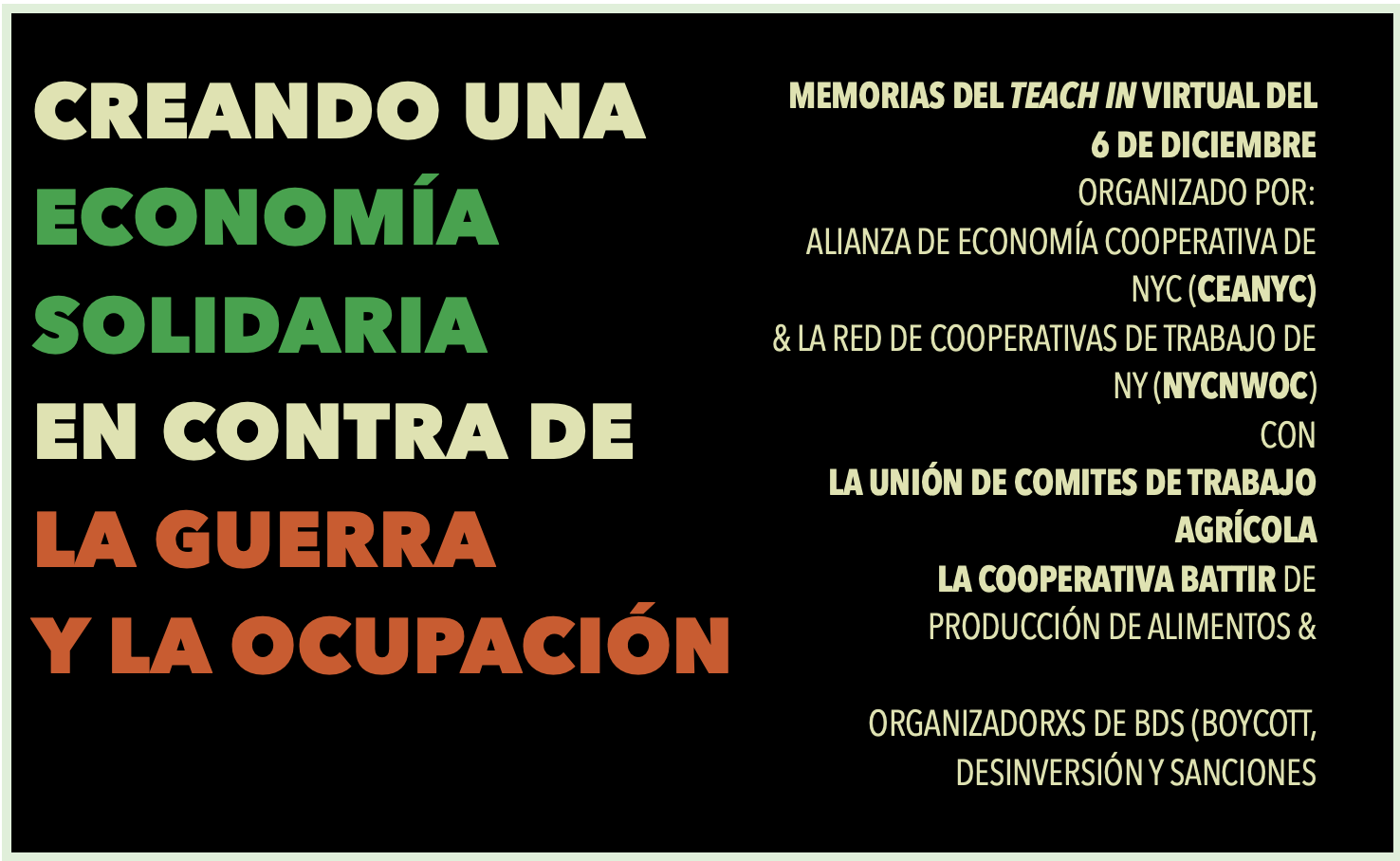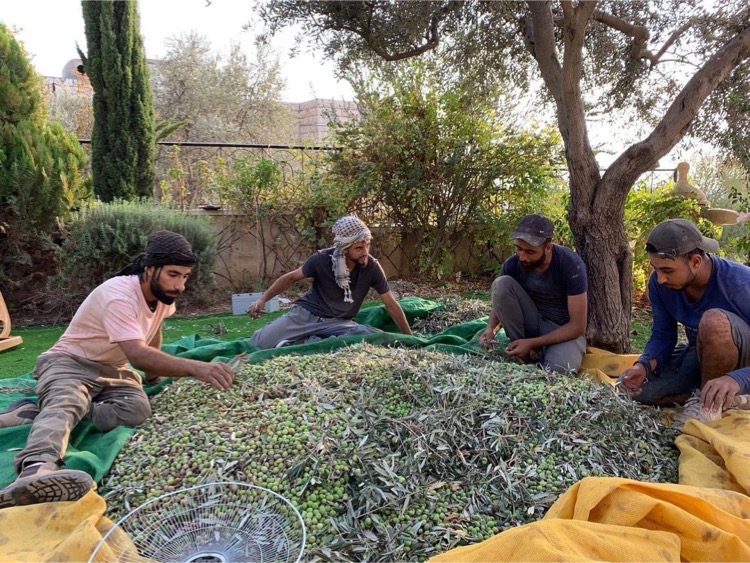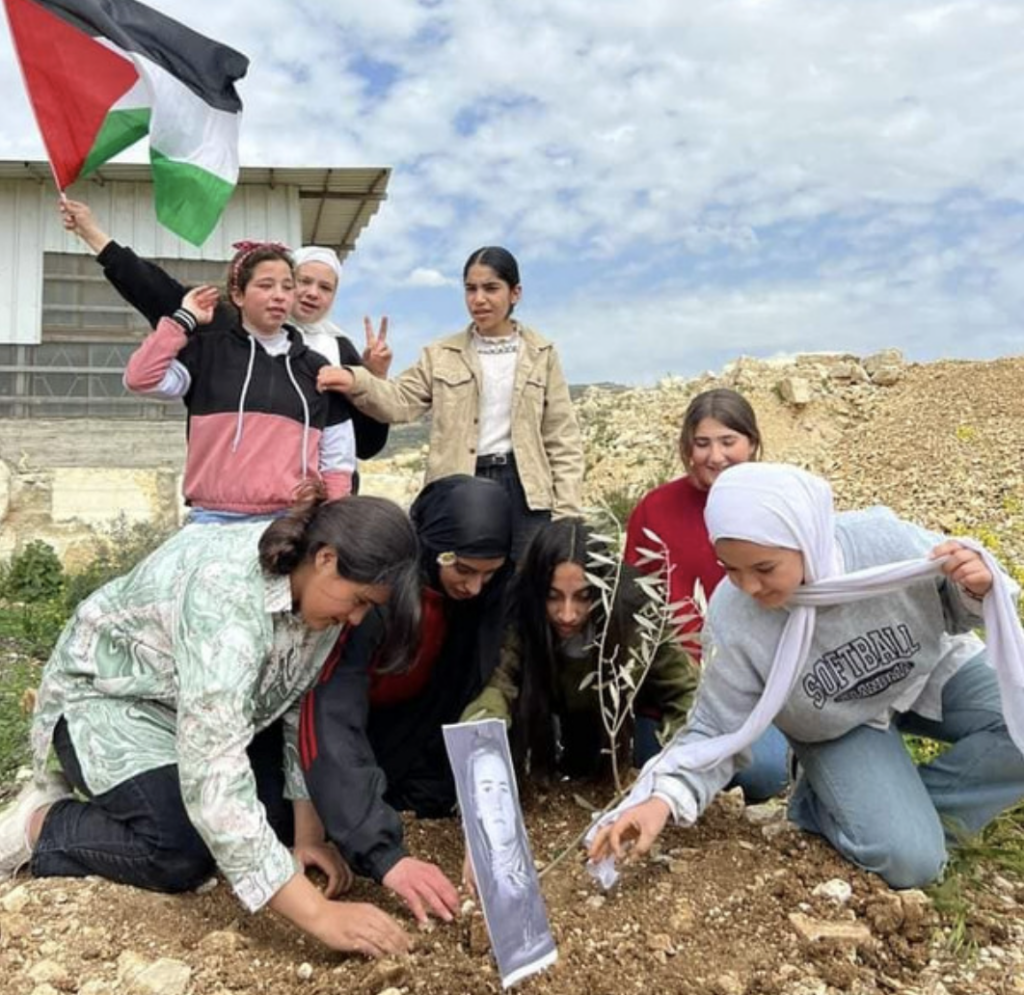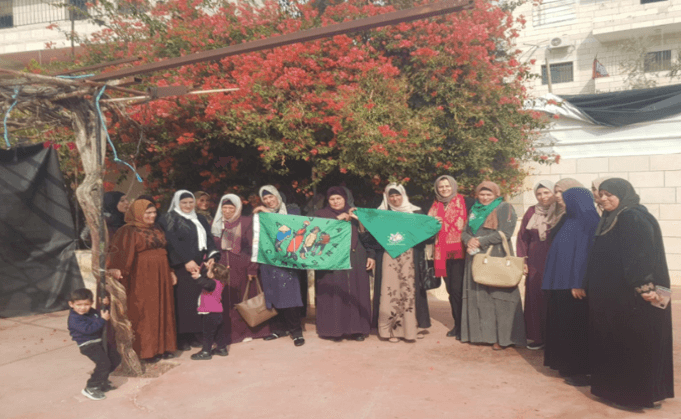**Español abajo**
On December 6th, NEC members the Cooperative Economics Alliance of NYC (CEANYC) and NYC Network of Worker Cooperatives (NYC NoWC) co-hosted an event for New York City co-ops and solidarity economy groups, exploring the connections between the solidarity economy and the growing movement for a Free Palestine.
As we leverage the power of divestment in this moment — working to end U.S. aid to Israel, stop war profiteering, and defund the military industrial complex — we also need to talk about what we *do* invest in to build economies of care and cooperation. In this event, we heard from two Palestinian cooperators about how Palestinians are investing in themselves and each other through cooperative economics, in spite of ongoing the genocide and oppression. We also heard from two NYC-based organizers involved in the Boycott, Divestment, Sanctions (BDS) movement about how cooperative movements can be in deeper solidarity with Palestinians.
SPEAKERS

- Yasmeen Al-Hasan – Union of Agricultural Work Committees – Ramallah, Palestine – The Union of Agricultural Work Committees is a grassroots Palestinian civil society organization working to support the steadfastness of Palestinian farmers, fisher people, peasants. They work to protect and defend Palestinian sovereignty in the face of the Israeli occupation and its dispossession of Palestinian land and natural resources.
- Samah Odeh Abu Nimah – Battir Food Production Cooperative – جمعية بتير التعاونية للتصنيع والانتاج الغذائي – Bethlehem, Palestine – A women’s agricultural co-op working to improve food production and provide dignified work for women in their community.
- Riham Barghouti – Adalah – New York – Riham is a Palestinian-American organizer who has been involved in the BDS movement since 2005.
- Ora Wise – Hospitality for Humanity, FIG – Brooklyn, New York Ora is a longtime popular educator around Palestine, food justice with FIG-NYC, and co-organizer of the recently launched Hospitality for Humanity.
STARVATION AS A WEAPON OF WAR
Yasmeen and Samah opened the call by sharing some of the horrifying impacts of the occupation and ongoing genocide, particularly in the agricultural sector. Yasmeen shared that they have lost hundreds of farmers and fisherpeople since the start of the bombing in Gaza. At least two offices of the Union of Agricultural Work Committees (UAWC) were bombed, and at least one staff member in Gaza was murdered when they were bombed along the designated evacuation route.
They explained that Israel is not only attacking Gaza militarily, but also by cutting off basic services and supplies, and using starvation as a weapon of war. Israel has bombed fishing boats, is destroying water desalination and sanitation plants, and is destroying fodder for animals and the water sources used to irrigate crops.
In Yasmeen’s words, “Israel is attempting to ensure that those who survive the bombs are condemned to a future without sustenance.”
And this is not only limited to Gaza. In the West Bank — which has most of the fertile land and is where most Palestinian peasants and farmers live — settler aggression has displaced at least 1,200 Palestinians since October.
Battir, where Samah’s cooperative is based, is a border town just outside of Bethlehem. She told us that the Israeli occupation constantly harasses people and blocks them from accessing their land during the harvest season. They cut Palestinians off from the road, set up barricades, and prohibit them from harvesting the olives they have worked to tend for generations. This is not to mention the 800,000+ olive trees, some of which were centuries old, that have been uprooted by Israeli forces since 1967.
RESISTANCE THROUGH COOPERATION
 Members of the Land of Despair Sprouts with Hope Co-op harvesting olives in 2020.
Members of the Land of Despair Sprouts with Hope Co-op harvesting olives in 2020.
In spite of the devastating conditions of Israeli occupation, Palestinians have continued to resist fiercely and continue their fight for food, land, and cultural sovereignty. As Yasmeen put it:
“We work to support and strengthen our rootedness in the land. Our relationship with this land is not a metaphor. It’s not just poetic. It’s not abstract. It’s material. Our land gives us the energy to resist, to fight, to revolt. If we have sovereignty of our land and resources we would be able to end the subjugation we’re subjected to. It’s not a matter of there aren’t enough resources. It’s a matter of settler colonialism and occupation.”
One of the ways that rural communities have been able to continue to function under these conditions is through cooperatives. Yasmeen and Samah noted that in Palestine, cooperatives are emerging out of the brutal lived experience of occupation, not out of theory read in a book. Women and youth in particular, have turned to cooperative economics as a way to support themselves under increasingly dire economic circumstances.
“There’s a renewed movement of youth building agricultural cooperatives in Palestine. My generation is the post-Oslo generation. We know the systems in place are not working. I’m impressed by the creativity of my peers in Palestine. They are arriving at systems of cooperation and community care, not because they read the words of a European who wrote about it, but because they lived the experience that led to it,” Yasmeen told us.
Samah shared more about the cooperative she’s involved with. The Battir Food Production Cooperative was started by 5 women in 2014, and formalized in 2021 as farmers were figuring out how to adapt when COVID entered the village. There are now 18 members, working to improve agricultural production, provide economic empowerment for women, and fight joblessness in their community.
Another co-op effort mentioned during the event was The Land of Despair Sprouts with Hope, or Ard al-Ya’s in Arabic, is a youth-led agricultural cooperative in Saffa, a village west of Ramallah in the occupied West Bank. The name of the co-op “reflects the group’s somber yet determined view of life under occupation, and their responsibilities within it.” The youth are working to protect their land and its ecology, while establishing a “resistance economy” that offers dignified work and centers “self-reliance as the basis of a viable Palestinian liberation struggle.”
CALLS TO ACTION FOR CO-OPS & THE SOLIDARITY ECONOMY MOVEMENT
 Photo via the Palestinian Social Fund
Photo via the Palestinian Social Fund
As members of the solidarity economy and cooperative movements in the US, we have an important role to play in dismantling Israeli apartheid and fighting for Palestinian sovereignty. Here’s some ideas of how you can take action with your co-op:
- Get in the streets and keep calling your reps – The number one demand from Palestinians on the ground is to keep pushing for a permanent ceasefire and opposing US military aid to Israel.
- Join a BDS campaign either as an individual or with your co-op/solidarity economy group. Cooperatives are a powerful site for collective action, and the values of the cooperative movement call on us to take material action. Co-ops can also play an important role in filling in gaps in the supply chain caused by boycotted goods.
- The Olympia Food Co-op has held a boycott against Israeli products since 2010.
- The Park Slope Food Co-op ran a referendum to boycott Israeli goods in 2012. Though it ultimately didn’t pass, it was important in building media attention and community dialogue.
- Worker solidarity – Support workers who are refusing to produce and transport weapons to Israel, and support creative direct action against weapons manufacturers.
- Be vocal and public about your support for Palestine, and host community teach-ins or create educational zines with your co-op. For example:
- If you’re part of a food co-op, explore the intersections of food sovereignty in Palestine.
- If you’re part of a credit union, examine how big banks are funding genocide and how we can divest.
- If you’re part of a housing co-op, study the insidious use of cooperative principles by illegal Israeli settlements.
SUPPORT PALESTINIAN COOPERATIVES
 Women of the Battir Food Production Cooperative
Women of the Battir Food Production Cooperative
As Dina Omar from the Palestinian Soap Cooperative reminded us, in addition to powerful opposition to Israeli apartheid and occupation, there should be strategic investment in the lives and livelihoods of Palestinian people. Here are some cooperatives and democratic organizations in Palestine you can support:
This was just an initial conversation and we look forward to continuing discussions with the community. We also invite co-ops and solidarity economy groups to have conversations within their own groups. If you have additional resources that have been useful, please send them our way.
PALESTINA LIBRE – RECURSOS EN ESPAÑOL
FREE PALESTINE – FURTHER RESOURCES IN ENGLISH
CREANDO UNA ECONOMÍA SOLIDARIA EN CONTRA DE LA GUERRA Y LA OCCUPACIÓN
|
| El 6 de Diciembre, la Alianza de Economía Cooperativa de la ciudad de Nueva York, miembros de NEC (New Economy Coalition) y la Red de Cooperativas de trabajo de la ciudad de Nueva York co- organizaron un evento para las cooperativas y los grupos de la economía solidaria. El evento explore las conexiones entre la economía solidaria y el movimiento que crece para apoyar la liberación de Palestina.
Mientras que aprovechamos el poder de la desinversión en este momento, para ponerle un fin al apoyo económico que da los Estados Unidos a Israel, y llamamos a quitarle los fondos al complejo industrial armamentista del ejército, debemos hablar de en *qué queremos invertir* para crear economías de cuidado y cooperación. En este evento escuchamos a dos personas cooperadoras de Palestina acerca de cómo las personas Palestinas están invirtiendo en si mismas y en lxs demás a través de las economías cooperativas, a pesar del constante genocidio y opresión que enfrentan. También escuchamos de parte de dos personas organizadoras en la ciudad de Nueva York sobre cómo el movimiento cooperativista puede profundizar su solidaridad con la gente Palestina.
PRESENTADORAS |
|
- Yasmeen Al-Hasan – Union de Comités de Trabajo Agrícola- Ramallah, Palestina – La Unión de Comités de Trabajo Agrícola es una organización de base de la Sociedad civil Palestina que trabaja para apoyar la tenacidad y persistencia de las personas agricultoras, pescadoras y campesinas. Trabajan para proteger y defender la soberanía palestina en vista de la ocupación de Israel y el despojo de la tierra y los recursos naturales.
- Samah Odeh Abu Nimah – Battir Food Production Cooperative – جمعية بتير التعاونية للتصنيع والانتاج الغذائي – Bethlehem, Palestina– Una cooperativa agrícola de mujeres que trabaja para mejorar la producción de alimentos y proveer trabajos dignos para mujeres en sus comunidades.
- Riham Barghouti – Adalah-Nueva York – Riham es palestina americana, organizadora que ha estado involucrada con el movimiento BDS desde el 2005.
- Ora Wise – Hospitality for Humanity, FIG – Brooklyn, Nueva York Ora es una educadora popular en los temas de Palestina, justicia alimentaria con FIG–NYC y es co-creadora del Proyecto recientemente creado Hospitality for Humanity.
EL HAMBRE Y LA INANICIÓN COMO ARMA DE GUERRA
Yasmeen y Samah iniciaron la session compartiendo algunos de los impactos horrorizantes de la ocupación y constante genocidio, particularmente en el sector agrícola. Yasmeen compartió que han perdido cientos de personas campesinas y pescadoras desde que iniciaron los bombardeos en Gaza. Al menos dos oficinas de la Unión de Comités de Trabajo Agrícola (UAWC) han sido bombardeados, y por lo menos una persona del equipo en Gaza ha sido asesinada cuando fueron bombardeadas en la ruta de evacuación designada.
Explicaron que Israel no solamente está atacando a Gaza militarmente, pero también está cortando los servicios básicos y provisiones y utilizando el hambre como arma de Guerra. Israel ha bombardeado botes de pesca y está destruyendo plantas de desalinificación y sanidad del agua, y está destruyendo el forraje para los animals y las fuentes de agua para el riego de cultivos.
En las palabras de Yasmeen, “Israel está tratando de garantizar que las personas que sobreviven las bombas están condenadas a un future sin sustento.”
Y esto está sucediendo no solamente en Gaza. En West Bank que tiene la tierra más fértil y que es la zona en donde viven la mayoría de las personas palestinas campesinas agriculturas – la agresión de los colonizadores ha desplazado al menos 1.200 personas palestinas desde Octubre.
Battir, donde está ubicada la cooperativa de Samah, es un pueblo de frontera en las afueras de Bethlehem. Ella nos dijo que la ocupación israelita acosa constantemente a la gente y les bloquea el acceso a la tierra durante la temporada de cosecha. Cortan el paso a la gente palestina, levantan barricadas y les prohíben recoger las aceitunas que han cultivado durante generaciones. Por no hablar de los más de 800.000 árboles de olivos, algunos centenarios, arrancados por las fuerzas israelíes desde 1967.
RESISTENCIA A TRAVÉS DE LA COOPERACIÓN |
|
| Cooperativa Tierra de Desesperación con Brotes de Esperanza cosechando aceitunas en 2020. |
|
| A pesar de las devastadoras condiciones de la ocupación israelí, los palestinos han seguido resistiendo perseverantemente y continúan su lucha por la soberanía alimentaria, territorial y cultural. En palabras de Yasmeen:
“Trabajamos para apoyar y reforzar nuestro arraigo a la tierra. Nuestra relación con esta tierra no es una metáfora. No es sólo poética. No es abstracta. Es material. Nuestra tierra nos da la energía para resistir, para luchar, para rebelarnos. Si tuviéramos soberanía sobre nuestra tierra y nuestros recursos podríamos acabar con la subyugación a la que estamos sometidos. No es cuestión de que no haya suficientes recursos. Es una cuestión de colonialismo de colonos y ocupación israelita”.
Una de las formas en que las comunidades rurales han podido seguir funcionando en estas condiciones es a través de las cooperativas. Yasmeen y Samah señalaron que, en Palestina, las cooperativas están surgiendo de la brutal experiencia vivida de la ocupación, no de la teoría leída en un libro. Las mujeres y los jóvenes, en particular, han recurrido a la economía cooperativa como una forma de mantenerse en circunstancias económicas cada vez más terribles.
“Hay un movimiento renovado de jóvenes que crean cooperativas agrícolas en Palestina. Mi generación es la posterior a Oslo. Sabemos que los sistemas vigentes no funcionan. Me impresiona la creatividad de mis compañerxs en Palestina. Están llegando a crear sistemas de cooperación, cuidado y atención comunitaria, no porque hayan leído las palabras de un europeo que escribió sobre eso, sino porque vivieron la experiencia que les llevó a hacerlo”, nos dijo Yasmeen.
Samah nos habló de la cooperativa en la que trabaja. La Cooperativa de Producción Alimentaria de Battir fue creada por cinco mujeres en 2014 y se formalizó en 2021, cuando las personas agricultoras estaban tratando de adaptarse a la llegada de COVID al pueblo. Ahora cuenta con 18 personas que trabajan para mejorar la producción agrícola, empoderar económicamente a las mujeres y luchar contra el desempleo en su comunidad.
Otra cooperativa mencionada durante el acto fue La tierra de la desesperación con brotes de esperanza, o Ard al-Ya’s en árabe, una cooperativa agrícola dirigida por jóvenes en Saffa, un pueblo al oeste de Ramala, en la Cisjordania (West Bank) ocupada. El nombre de la cooperativa “refleja la visión sombría pero decidida del grupo sobre la vida bajo la ocupación israelita, y sus responsabilidades dentro de ella“. Los jóvenes trabajan para proteger su tierra y su ecología, al tiempo que establecen una “economía de resistencia” que ofrece un trabajo digno y centra “la autogestión y autosuficiencia como base de una lucha de liberación palestina viable.”
LLAMADO A LA ACCIÓN PARA COOPERATIVAS Y EL MOVIMIENTO DE LA ECONOMÍA SOLIDARIA |
|
|
Photo via the Palestinian Social Fund
|
|
Como participantes de la economía solidaria y de los movimientos cooperativos de Estados Unidos, tenemos un importante papel que desempeñar en el desmantelamiento del apartheid israelí y en la lucha por la soberanía palestina. Aquí tienes algunas ideas de cómo puedes actuar con tu cooperativa:
- Sal a las calles y sigue llamando a tus representantes políticos – La demanda número uno de los palestinos sobre el terreno es seguir presionando por un alto el fuego permanente y oponerse a la ayuda militar de EE.UU. a Israel.
- Únete a una campaña de BDS individual o con tu cooperativa/grupo de economía solidaria. Las cooperativas son un lugar poderoso para la acción colectiva, y los valores del movimiento cooperativo nos llaman a la acción material. Las cooperativas también pueden desempeñar un papel importante a la hora de llenar los vacíos en la cadena de suministro causados por los productos boicoteados.
- La Olympia Food Co-op mantiene un boicot contra los productos israelíes desde 2010.
- La cooperativa Park Slope Food Co-op organizó un referéndum para boicotear los productos israelíes en 2012. Aunque finalmente no se aprobó, fue importante para atraer la atención de los medios de comunicación y el diálogo comunitario.
- Solidaridad de las personas trabajadoras – Apoyemos a las personas trabajadoras que se niegan a producir y transportar armas a Israel, y apoye la acción directa creativa contra los fabricantes de armas.
- Recientemente, el sindicato United Auto Workers se convirtió en el mayor sindicato en pedir un alto el fuego permanente y romper lazos con los que hacen dinero de la guerra.
- En noviembre, los estibadores del Puerto de Barcelona se comprometieron a no cargar armas para Israel ni para ninguna zona de conflicto.
- Haz público tu apoyo a Palestina y organiza charlas en tu comunidad o crea materiales educativos con tu cooperativa. Por ejemplo:
APOYA A LAS COOPERATIVAS PALESTINAS |
|
|
Women of the Battir Food Production Cooperative
|
|
| Como nos recordó Dina Omar, de la Cooperativa Palestina de Jabón, además de una oposición poderosa al apartheid y la ocupación israelíes, debe haber una inversión estratégica en la vida y los medios de subsistencia del pueblo palestino. Aquí tienes algunas cooperativas y organizaciones democráticas de Palestina a las que puedes apoyar:
Esto fue sólo una conversación inicial y esperamos continuar las discusiones con la comunidad. También invitamos a las cooperativas y grupos de economía solidaria a mantener conversaciones dentro de sus propios grupos. Si tienes recursos adicionales que le hayan sido útiles, por favor envíenoslos.
PALESTINA LIBRE RECURSOS EN ESPAÑOL
MÁS RECURSOS EN INGLÉS |
|

 Members of the Land of Despair Sprouts with Hope Co-op harvesting olives in 2020.
Members of the Land of Despair Sprouts with Hope Co-op harvesting olives in 2020.  Photo via the Palestinian Social Fund
Photo via the Palestinian Social Fund Women of the Battir Food Production Cooperative
Women of the Battir Food Production Cooperative





